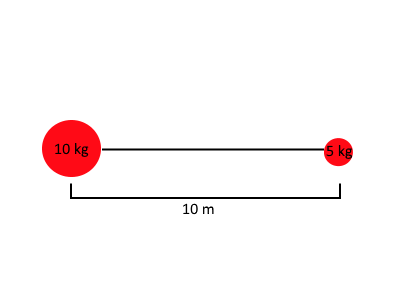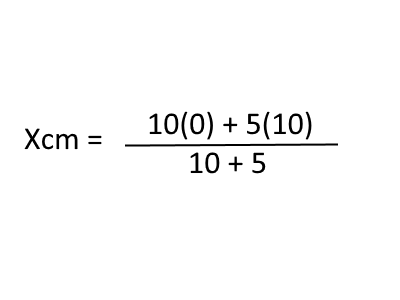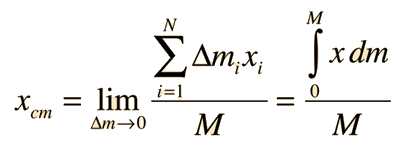Center of Mass
Claimed by Alex Huynh (ahuynh9)
The Main Idea
The center of mass of an object is the point in space where if a force was applied, the object moves according to Newton's laws without rotation. At the center of mass, the distribution of mass is balanced, and the average of the weighted position coordinates of the distributed mass defines its coordinates. Mechanical calculations are often simplified with respect to the center of mass of objects.
When a force is applied not to the center of mass:
A Mathematical Model
The position of the center of mass of an object can be found by summating the product of each point mass and its relative linear position and dividing by the sum by the total mass.
This equation can then be extended to three dimensions.
When calculating the center of mass for a continuous distribution of mass, the expression becomes an infinite sum that can be expressed in the form of an integral.
Examples
Be sure to show all steps in your solution and include diagrams whenever possible
Simple
A 10 kg point mass and a 5 kg point mass are connected by a 10 m massless rod. Find the center of mass. This is example of a 1-dimensional center of mass problem.

Solution
First, we will need to establish an origin. For simplicity, we will establish the left end, the position of the 10 kg point mass, as the origin. Relative to the origin, the position of the 10 kg mass is 0 m and the position of the 5 kg mass is 10 m. Placing these values into our formula for 1-dimensional center of mass, we get:
 Therefore, the center of mass is 10/3 m from the left end of the rod. It is important to state your distances relative to your stated origin.
Therefore, the center of mass is 10/3 m from the left end of the rod. It is important to state your distances relative to your stated origin.
Middling
Difficult
Connectedness
- How is this topic connected to something that you are interested in?
- How is it connected to your major?
- Is there an interesting industrial application?
History
The concept of center of mass was first introduced by Archimedes while he worked to simplify assumptions about gravity that amounted to a uniform field, thus arriving at the mathematical properties of the center of mass. In an experiment, Archimedes observed that the torque exerted on a lever by weights resting at various points along the lever is the same as what it would be if all of the weights were moved to a single point—their center of mass. He developed mathematical techniques for finding the centers of mass of objects of uniform density of various well-defined shapes.
See also
Are there related topics or categories in this wiki resource for the curious reader to explore? How does this topic fit into that context?
Further reading
PhysicsLab [1]
HyperPhysics [2]
Wikipedia [3]
External links
PhysicsLab [4]
HyperPhysics [5]
Wikipedia [6]
References
This section contains the the references you used while writing this page




